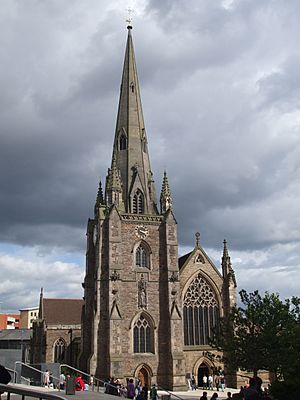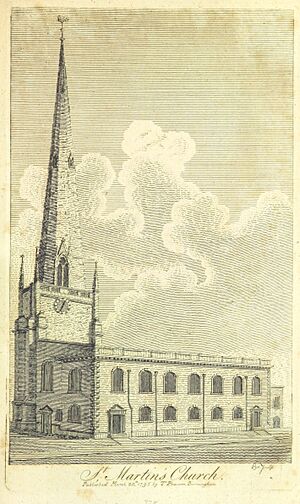St Martin in the Bull Ring facts for kids
Quick facts for kids St Martin in the Bull Ring, Birmingham Parish Church |
|
|---|---|
 |
|
| 52°28′37.2″N 1°53′35.52″W / 52.477000°N 1.8932000°W | |
| Location | Birmingham |
| Country | England |
| Denomination | Church of England |
| Churchmanship | mixed |
| Website | bullring.org |
| History | |
| Dedication | Saint Martin |
| Architecture | |
| Heritage designation | Grade II* listed |
| Architect(s) | J. A. Chatwin |
| Architectural type | Neo-Gothic |
| Specifications | |
| Length | 155 feet (47 m) |
| Width | 104 feet (32 m) |
| Nave width | 25 feet (7.6 m) |
| Height | 60 feet (18 m) |
| Spire height | 200 feet (61 m) |
| Bells | 16 |
| Tenor bell weight | 39 long cwt 1 qr 19 lb (4,415 lb or 2,003 kg) |
| Administration | |
| Parish | St. Martin-in-the-Bull-Ring, Birmingham |
| Deanery | Central Birmingham |
| Archdeaconry | Birmingham |
| Diocese | Birmingham |
| Province | Canterbury |
St Martin in the Bull Ring is a Church of England church located in Birmingham, England. It is known as the original parish church of Birmingham. You can find it right between the famous Bull Ring Shopping Centre and the city's markets.
This church is a very important building, listed as Grade II*. This means it has special historical or architectural value. The main priest, called the rector, is currently Jeremy Allcock.
Contents
History of St Martin's Church
The First Church Building
The church you see today was built on the same spot where a much older church stood. The first church was built in the 13th century, around the year 1263. Over time, it was made bigger. It had a tall main area (nave), a special area for the altar (chancel), side sections (aisles), and a tower with a tall, pointed top (spire).
The church also had a clock and chimes very early on. Records from 1547 show that a group called the Guild of the Holy Cross was in charge of keeping the clock and chimes working. Later, in 1690, the church was covered in bricks, except for its spire.

In 1781, part of the spire was rebuilt and made stronger with an iron pole inside it. By 1808, the spire had been hit by lightning three times! In 1853, the brick covering was removed from the tower, and an outdoor pulpit was added.
The Current Church Building
In 1873, the old church was taken down and a new one was built by an architect named J. A. Chatwin. The old tower and spire were kept and used in the new design. While the old church was being taken apart, workers found old wall paintings and decorations from the medieval period. One painting showed Saint Martin sharing his cloak with a beggar.
The outside of the current church is made from a type of stone called Grinshill stone. Inside, it's made of sandstone and has a special wooden roof. This roof is like the famous one in Westminster Hall. It has beautiful wooden beams decorated with carvings of angels. This huge roof weighs about 93 tons (94.5 tonnes)!
The floor tiles inside are from a company called Minton and show the old family symbol of the de Bermingham family, who were important in Birmingham's history. The bronze font, used for baptisms, was made by Jacqueline Stieger.
Church Size
The church is quite large! From one end to the other, it is about 155 feet (47 meters) long. The main area (nave) is about 25 feet (7.6 meters) wide, and the total width, including the side sections, is about 67 feet (20.4 meters). At its widest point, across the transepts (the arms of the cross shape), it is about 104 feet (31.7 meters) wide. The roof is about 60 feet (18.2 meters) high.
Beautiful Windows
The church has many amazing stained-glass windows. One special window in the south transept was designed by Edward Burne-Jones and made by William Morris in 1875. This window was taken down for safety just before a bomb hit near the church during World War II in 1941. That bomb destroyed all the other windows. The large window at the west end of the church is a copy from 1954 of the original 1875 window that was destroyed in the war.
-
South transept window designed by Burne-Jones and made by Morris & Co.
Church Bells
In 1552, St Martin's had four bells, along with its clock and chimes. By 1682, there were six bells. In 1745, when John Wesley was preaching nearby, the church bells were rung loudly to try and stop people from hearing him!
In 1758, ten new bells were installed, and then two more were added in 1772, making a total of twelve. The first time church bells were broadcast on the radio was from St Martin's in May 1924.
The bells were recast (melted down and reshaped) in 1928. In 1991, a new set of sixteen bells was installed. This was very unusual, as most churches have five, six, eight, ten, or at most twelve bells. As of 2024, there are only three churches in the world with sixteen bells that can be rung together in a special way called change ringing.
The Organ
St Martin's Church has had an organ for a very long time. Records show there was an organist even before the Reformation.
After the English Civil War, the church needed a new organ. In 1725, the church leaders decided to raise money to buy one. An organ was installed that year. This organ was later removed or replaced in 1822.
In 1822, a new organ was put in. This organ was made bigger in 1855 and then rebuilt and enlarged again in 1875 and 1883.
The current large pipe organ was built by Harrison & Harrison in 1906. It was originally on the north side of the altar area. In 1955, it was rebuilt and moved to the north transept. A famous organist named George Thalben-Ball played the first concert on the rebuilt organ on March 30, 1955.
Today, the organ is still used for some services, like the Sunday 9:30 am Holy Communion and evening Choral Services.
Images for kids
Other Churches from St Martin's Parish
St Martin's parish used to be very large, covering much of modern Birmingham. As the city grew, new churches were built, and parts of St Martin's parish were given to these new churches. Here are some of the churches that were created from St Martin's parish:
- St Philips (1708)
- St George (1830)
- All Saints (1830)
- St Thomas (1830)
- Bishop Ryder Church (1841)
- St Mary's (1841)
- St Paul's (1841)
- St Luke (1843)
- St Mark (1843)
- St Jude (1845)
- St Bartholomew (1847)
- St John (1854)
- St Barnabas (1861)
- Christ Church (1865)
- St Gabriel (1869)
See also
 In Spanish: Iglesia de San Martín (Bull Ring) para niños
In Spanish: Iglesia de San Martín (Bull Ring) para niños
 | Chris Smalls |
 | Fred Hampton |
 | Ralph Abernathy |
















